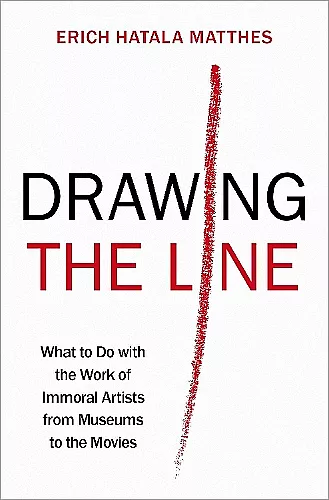Drawing the Line
What to Do with the Work of Immoral Artists from Museums to the Movies
Format:Hardback
Publisher:Oxford University Press Inc
Published:24th Mar '22
Should be back in stock very soon

This book examines the moral complexities of appreciating art created by controversial figures, urging readers to engage thoughtfully with their work. Drawing the Line offers valuable insights.
In Drawing the Line, Erich Hatala Matthes explores the complex relationship between artists and their art in the wake of recent scandals involving prominent figures. With the rise of the #metoo movement and heightened scrutiny enabled by social media, many beloved entertainers have faced public backlash for their misdeeds and controversial views. This book delves into the moral dilemmas that arise when we consider whether we can still appreciate the work of artists like Woody Allen, Bill Cosby, and others, despite their troubling personal histories.
Matthes argues that the lives of artists are not irrelevant to their work; rather, they significantly shape our moral and aesthetic engagement with their creations. He challenges the notion that we can easily separate an artist from their art, suggesting that doing so may overlook the deeper implications of their actions. By examining the ethical questions surrounding this issue, Drawing the Line encourages readers to confront their feelings about consuming art created by flawed individuals while navigating the tricky terrain of moral responsibility.
Ultimately, Matthes advocates for a thoughtful engagement with art, urging us to use these works as resources for grappling with the complexities of morality. Instead of canceling or dismissing art from problematic figures, he posits that we should analyze and reflect on the intricate connections between the artist's life and their work. This insightful exploration prompts us to reconsider our approach to art and the responsibilities we hold as consumers in a morally nuanced world.
Engaging, personal and limpid, the book is a delight to read. Matthes proves himself to be not only a clear communicator of sometimes intricate ideas, but a deft one too. The text ripples with vivid examples, offbeat quips, instructive metaphors and personal reflections, which animate the problems it covers...The book is a gourmet hamburger: rich, yet down-to-earth, and unlikely to benefit from my unsolicited garnish of saffron and truffle oil. I encourage anyone vexed by immoral artists to tuck in. * Analysis *
Matthes argues that we can recognize that a work of art has been worsened by the immorality of its creator, even to the point that we can no longer personally enjoy it, while accepting that others can still find it appealing. * Andy Lamey, Toronto Star *
Hatala Matthes is thorough, nuanced and thoughtful throughout Drawing the Line is a clear, lively exploration of an extremely important issue. It doesnt aim to be definitive, but it left me wanting more. It also made me want to sit down with a glass of wine and re-watch Love and Death. * Christina Patterson, Sunday Times *
Erich Hatala Matthes's Drawing the Line offers guidance on the current 'cancel culture' controversies: how should we assess artworks by flawed human beings like Gauguin, J.K. Rowling, Woody Allen, and others? Matthes's nuanced advice is that we should separate the artist from the art and distinguish private from public reactions, while accepting that we may remain emotionally conflicted about works that we particularly treasure. Drawing the Line is an engaging and conversational book that offers plain-spoken insights drawn from the best recent work in aesthetics and moral theory. * Cynthia Freeland, University of Houston *
Erich Hatala Matthes' wonderful book is both beautifully clear and at the same time quite subtle. Matthes goes beyond public hand-wringing over 'cancel culture' and 'no-platforming' to dive into more difficult (and ultimately more interesting) problems, including the nature of complicity, artistic value, moral responsibility, trust and betrayal, and much more. This short book goes a long way towards making the case that it is important to think carefully about morality, art, and artists. * James Harold, Philosophy, Mount Holyoke College, author of Dangerous Art: On Moral Judgments of Artworks *
In Drawing the Line Erich Matthes takes us on a vivid and fun journey through the fascinating and thorny issues at the intersection of aesthetics and morality: Is it ok to laugh at offensive jokes? Is it wrong to enjoy the works of immoral artists? Drawing the Line illustrates how easy it is to get confused about these issues and helps us make up our minds. In doing so, it embodies the power of good philosophy to be culturally relevant and confirms the necessity of clear and detailed thinking on matters of cultural urgency. It is free of pointless jargon, full of instructive examples, and Matthes's expertise in both moral philosophy and aesthetics really shines. * Nick Riggle, Associate Professor the University of San Diego and author of On Being Awesome: A Unified Theory of How Not to Suck *
Is it OK to still enjoy the works of problematic artists? Should we boycott them? Should we cancel them? And what the hell does 'canceling' mean, anyway? Erich Matthes' Drawing the Line is a wonderfully accessible, entertaining, and deep response to these questions. It is the opposite of a hot take. Where the cultural discourse tends to hand-wave and mush together a hundred different issues, Matthes offers us nuance and care. Drawing the Line shows how many really distinctive issues are in play. It disentangles them for us, and shows how incredibly different and complicated the answers can get. And it actually does real work to help us figure out how to navigate our way through the mess. * C. Thi Nguyen, University of Utah *
In his approachable integration of aesthetic and ethical principles with real-world examples, Matthes feels like a friend talking you through different angles on a problem that's been bothering you for years. * Nandini Pandey, Los Angeles Review of Books *
ISBN: 9780197537572
Dimensions: 137mm x 182mm x 18mm
Weight: 254g
184 pages